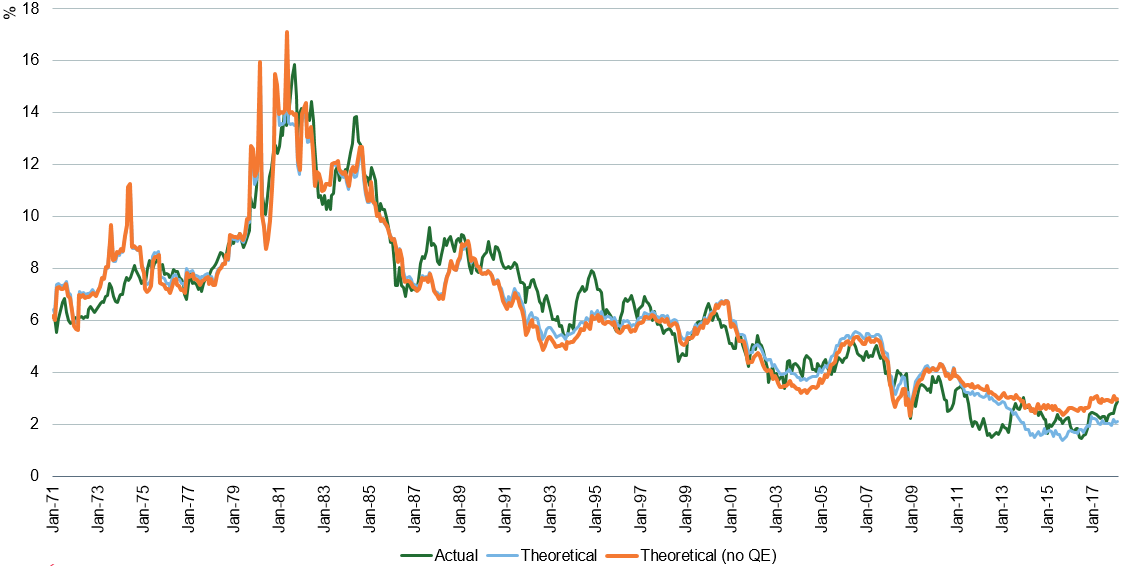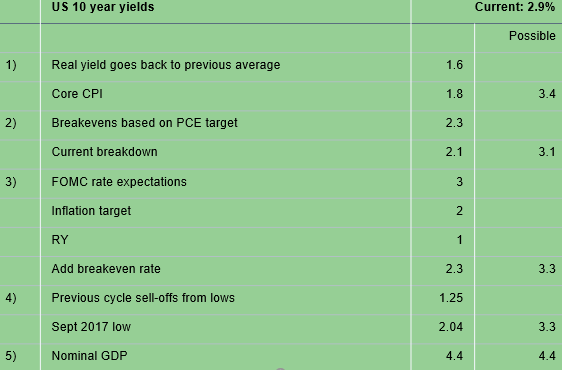Across the world, central banks are gradually relinquishing their extremely ‘dovish’ monetary policies. One consequence of this is that the supply of government bonds is likely to increase, after a period in which the lighter provision of bonds has offered technical support to the market since the global financial crisis.
In eschewing a dovish stance, the Federal Reserve (Fed) is leading the way for other central banks, and it is likely to carry on raising interest rates. Two hikes are priced in for 2018 to follow the three rate increases in 2017 and one in March 2018. Such prospective Fed action presumes that inflation will remain at or above 2% and that unemployment will stay low. With the budget deficit rising, we believe the Fed will be inclined to stick with its new-found hawkishness, although, so far, inflation is yet to cause undue concern.
Another Leg Up
We see little evidence that the rise in borrowing costs is having any meaningful impact on companies yet, or of anything other than a modest impact on the housing market. So long as that remains the case, risk assets could stabilize to the detriment of Treasuries, which are generally perceived by investors as safe havens. Buying floating-rate notes and shorting government bonds could be one way to approach such an investment scenario.
With central banks moving at different speeds, the policies of governments are also diverging. For example, the U.S. has embarked on a fiscal splurge in the late stages of the business cycle, and this could well have some inflationary consequences (with increased fiscal spending being a way for governments to seek to counteract voter discontent). The differing fiscal and current-account balances of economies will inevitably influence their respective currencies and interest rates. In the absence of political risk, the currencies of nations with high current-account surpluses will tend to rise against those of countries with deficits.
Inflation Watch
We expect that U.S. inflation will steadily increase through 2018 as wages edge higher and the reversal of globalization results in higher costs. However, U.S. average earnings recently dropped back from the levels seen in January (easing some inflation concerns), resulting in cheaper Treasury Inflation-Protected Securities, and increasing the impetus to buy them.
In our view, banks are now better capitalized and more regulated as a result of state intervention, and we think this should continue to offer bond holders stronger protection against losses. With central banks starting to normalize interest rates, the likelihood of steeper yield curves is set to improve the profitability of banks.
The persistently weak nature of economic growth is throwing into sharp relief the divergence within industries and among companies, especially as competition is high and elevated levels of capital expenditure exert pressure. We believe that one benefit of economies of scale is the ability to drive further industry consolidation. We believe, therefore, that larger companies in the telecommunications, consumer staples and beverage sectors are at a significant advantage over smaller competitors.
Besides the challenge of inflation, global growth has created significant stress on environmental resources and, with it, an increased public clamor for cleaner and sustainable, but also affordable, energy sources. As companies and investors adopt more stringent environmental standards, and with more investments flowing into the infrastructure which is creating a ‘greener’ planet, the case is likely to grow for both direct and indirect exposure to renewables, electric vehicles and more sustainable utilities.
With the possibility of a further tightening of monetary policy, higher bond yields could begin to affect the appetite of investors for equities and corporate bonds against a backdrop of continued volatility. Should rising inflation provoke surprises, this may reduce the attractiveness of Treasuries.
Hawkish Central Banks
10-year Treasury Yields
Source: Bloomberg, Newton, February 28, 2018
Bond Yields Have Been Suppressed by Loose Monetary Policy
Source: Bloomberg, Newton, February 28, 2018
This is a financial promotion. Material in this publication is for general information only. The opinions expressed in this document are those of Newton and should not be construed as investment advice or recommendations for any purchase or sale of any specific security or commodity. Certain information contained herein is based on outside sources believed to be reliable, but its accuracy is not guaranteed. You should consult your advisor to determine whether any particular investment strategy is appropriate. This material is for institutional investors only. Any reference to a specific security, country or sector should not be construed as a recommendation to buy or sell this security, country or sector. Please note that strategy holdings and positioning are subject to change without notice.
Important information
This is a financial promotion. Issued by Newton Investment Management Limited, The Bank of New York Mellon Centre, 160 Queen Victoria Street, London, EC4V 4LA. Newton Investment Management Limited is authorized and regulated by the Financial Conduct Authority, 12 Endeavour Square, London, E20 1JN and is a subsidiary of The Bank of New York Mellon Corporation. 'Newton' and/or 'Newton Investment Management' brand refers to Newton Investment Management Limited. Newton is registered in England No. 01371973. VAT registration number GB: 577 7181 95. Newton is registered with the SEC as an investment adviser under the Investment Advisers Act of 1940. Newton's investment business is described in Form ADV, Part 1 and 2, which can be obtained from the SEC.gov website or obtained upon request. Material in this publication is for general information only. The opinions expressed in this document are those of Newton and should not be construed as investment advice or recommendations for any purchase or sale of any specific security or commodity. Certain information contained herein is based on outside sources believed to be reliable, but its accuracy is not guaranteed. You should consult your advisor to determine whether any particular investment strategy is appropriate. This material is for institutional investors only.
Personnel of certain of our BNY Mellon affiliates may act as: (i) registered representatives of BNY Mellon Securities Corporation (in its capacity as a registered broker-dealer) to offer securities, (ii) officers of the Bank of New York Mellon (a New York chartered bank) to offer bank-maintained collective investment funds, and (iii) Associated Persons of BNY Mellon Securities Corporation (in its capacity as a registered investment adviser) to offer separately managed accounts managed by BNY Mellon Investment Management firms, including Newton and (iv) representatives of Newton Americas, a Division of BNY Mellon Securities Corporation, U.S. Distributor of Newton Investment Management Limited.
Unless you are notified to the contrary, the products and services mentioned are not insured by the FDIC (or by any governmental entity) and are not guaranteed by or obligations of The Bank of New York or any of its affiliates. The Bank of New York assumes no responsibility for the accuracy or completeness of the above data and disclaims all expressed or implied warranties in connection therewith. © 2020 The Bank of New York Company, Inc. All rights reserved.







